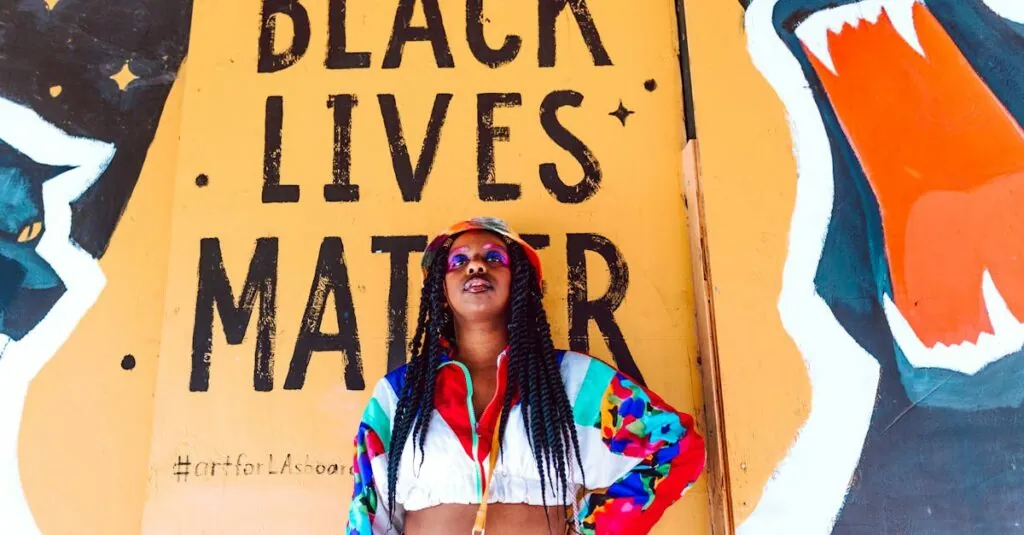In a world where everyone’s trying to find their place, identity memes have taken social media by storm. These quirky, often hilarious images capture the essence of what it means to be human, poking fun at our quirks and challenges while connecting us through shared experiences. Who knew that a simple meme could spark a conversation about identity, belonging, and the absurdity of life?
Whether it’s a relatable moment of existential dread or a lighthearted jab at our daily struggles, identity memes allow people to express themselves in a way that’s both entertaining and thought-provoking. Dive into the world of identity memes, where laughter meets introspection, and discover how these digital gems reflect the complexities of modern life. After all, if you can’t laugh at yourself, what’s the point?
Table of Contents
ToggleUnderstanding Identity Meme
Identity memes capture the essence of individual experiences through wit and relatability. These digital expressions resonate deeply in the social media landscape, offering avenues for personal reflection and communal humor.
Definition and Origin
An identity meme starts as an image, video, or text filled with humor, showcasing shared experiences and emotions. Their origin traces back to early internet culture, rooted in forums and social media platforms. The format often highlights personal characteristics, unique experiences, or cultural references. This method invites users to convey their narratives visually, making them accessible to a broad audience. Identity memes evolve continuously, adapting to trends while maintaining an authentic connection to users’ lives.
Cultural Significance
Cultural significance of identity memes lies in their ability to foster community and connection. They serve as vehicles for people to share their stories and find solidarity in shared struggles. Memes also reflect societal issues, offering commentary on topics like race, gender, and mental health. Diverse voices contribute to these conversations, enriching cultural discussions. By combining humor and relatability, identity memes engage audiences, encouraging dialogue on identity’s complexities. These conversations often lead to deeper understanding and empathy within communities, showcasing how humor unites people across different backgrounds.
Types of Identity Memes
Identity memes can be categorized into different types, reflecting various facets of human experience. Two prominent categories include personal identity memes and group identity memes.
Personal Identity Memes
Personal identity memes focus on individual experiences and emotions. Users often create these memes to share unique aspects of their lives. Humor plays a central role in conveying personal quirks and relatable situations. For instance, memes expressing introversion capture the struggles of social interactions effectively. Such memes resonate with individuals as they depict genuine feelings and provide validation. By showcasing personal narratives, these memes foster a sense of connection and support among users facing similar challenges.
Group Identity Memes
Group identity memes center around collective experiences shared by communities. They often highlight cultural, racial, or social identities, bringing visibility to shared challenges and triumphs. These memes serve as a unifying force, allowing groups to rally around common themes. For example, memes that address cultural heritage can promote pride and solidarity. By engaging with specific group experiences, these memes facilitate dialogue and understanding among diverse individuals. As a result, they connect people through their shared identities while offering commentary on broader societal issues.
The Impact of Identity Memes on Society
Identity memes significantly shape cultural discourse and community dynamics. They’re not just humorous images or texts. These memes serve as powerful tools for self-expression and societal commentary.
Influence on Social Movements
Identity memes often play a pivotal role in mobilizing social movements. They quickly spread awareness about issues like racial injustice and gender equality. Memes such as “Black Lives Matter” and “Me Too” encapsulate complex sentiments in relatable formats. Individuals use these memes to rally support and share personal stories. As these memes gain traction, they contribute to a larger narrative, promoting solidarity and driving change.
Role in Online Communities
Online communities thrive on the shared experience of identity memes. These memes foster a sense of belonging among diverse individuals. Users engage with content that resonates with their personal narratives. Participation in meme-sharing encourages dialogue around significant societal topics. Shared laughter and relatability strengthen connections within these digital spaces. Ultimately, identity memes not only entertain but also unite individuals under common themes and challenges.
Analyzing Popular Identity Memes
Identity memes serve as a fascinating lens through which to examine cultural dynamics. They capture individual narratives and collective identities with humor and relatability.
Case Study: “Is This a Pigeon?”
“Is This a Pigeon?” illustrates the absurdities of identity misunderstandings. The meme features an anime character mistakenly identifying a butterfly as a pigeon. Users often adapt the image to showcase their personal experiences with mislabeling or misunderstanding social cues. This reinforces collective sentiments around identity and perception, making it relatable for many who navigate social contexts.
Case Study: “Distracted Boyfriend”
“Distracted Boyfriend” offers another compelling example. The meme depicts a man turning away from his girlfriend to gaze at another woman. It represents conflicting loyalties and desires within identity exploration. Various adaptations highlight the struggle between personal aspirations and societal expectations. This flexibility allows individuals to connect with the imagery, emphasizing the complexities of modern identity negotiation.
Identity memes have become a significant part of online culture. They not only entertain but also foster connections by highlighting shared experiences and collective struggles. By using humor to address complex themes of identity and belonging, these memes encourage dialogue and understanding among diverse communities.
As they continue to evolve, identity memes will likely play an even more crucial role in shaping conversations around societal issues. Their ability to encapsulate profound sentiments in relatable formats makes them powerful tools for self-expression and social commentary. Ultimately, identity memes enrich the digital landscape, uniting individuals while providing a platform for voices that seek to be heard.




